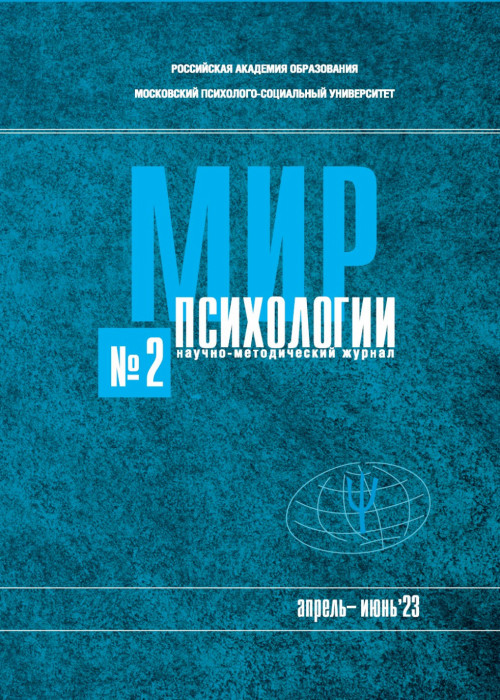Published Date: 01.04.2023
Propaedeutic Course of Nature Studies: Transition from “Naive” to Scientific Concepts During the Transfer Period from Primary to Secondary Education
Annotation
We consider an exemplary fragment of the introductory natural sciences course, designed within the activity approach. The magnetic interaction concepts’ acquisition is described as students’ special work in the «text-lab-model» triad, revolving around the practical task of following the compass. We focus on the mediation role of the learninginquiry actions in the students’ transition from «naive» to scientific concepts.
Keywords
| Type | Article |
| Information | WORLD OF PSYCHOLOGY № 02/2023 |
| Pages | 216-224 |
| UDK | 159.955.2 |
| DOI | 10.51944/20738528_2023_2_216 |
Library
1. 1. Введение в естественные науки: взгляд со стороны культурной истории человечества / Е. В. Высоцкая, А. Д. Лобанова, М. А. Янишевская, С. Б. Хребтова // Психологическая наука и образование.— 2020.— Т. 25, №5.— С. 95–108.— DOI: 10.17759/pse.2020250508
2. 2. Давыдов, В. В. Теория развивающего обучения / В. В. Давыдов. — Москва : ИНТОР, 1996. — 544 с.
3. 3. Давыдов, В. В. Виды обобщения в обучении : Логико-психологические проблемы построения учебных предметов / В. В. Давыдов. — Москва : Педагогическое общество России, 2000. — 480 с.
4. 4. Зенцова, И. М. Модель организации наблюдений и опытов в домашних условиях для младших школьников как средство пропедевтики изучения физики / И. М. Зенцова // Бизнес. Образование. Право. — 2021. — №4 (57). — С. 354–359. — DOI: 10.25683/ VOLBI.2021.57.42
5. 5. Иванова, Н.Б.Методика подготовки учителей начальных классов к корректному преподаванию физических понятий / Н.Б. Иванова, Ю.В. Иванов, О.Ю. Иванов // Вестник Белгородского института развития образования. — 2020. — Т. 7, № 3 (17). — С. 13–19.
6. 6. Марикур, П. де. Послание о магните (1269) / Пьер де Марикур // Труды Института истории естествознания и техники. — Москва, 1959. — Т. 22. — С. 298–309.
7. 7. Подготовка учителя начального естествознания общеобразовательной школы: природоведение как пропедевтический курс / Е. В. Высоцкая, А. Д. Лобанова, М. А. Янишевская [и др.] // Сборник материалов II Съезда тренеров-технологов деятельностных образовательн
8. 8. Природоведение, или О чем расскажут естественные науки : [в 8 кн.] / Е. В. Высоцкая, А. Д. Лобанова, С. Б. Хребтова, М. А. Янишевская. — Москва : Авторский клуб, 2022. — Кн. 8. Возвращение домой. — 52 с.
9. 9. Сабирова, Ф. М. Повышение интереса младших школьников к опытному изучению физических явлений на основе использования элементов технологии проблемного обучения / Ф. М. Сабирова, А. В. Дерягин // Балтийский гуманитарный журнал. — 2017. — Т. 6, № 1 (18).
10. 10. Толстой, Л. Н. Русская книга для чтения / Л. Н. Толстой. — Москва : Белый город, 2020. — 400 с.
11. 11. An early start to STEM education among year 1 primary students through projectbased inquiry learning in the context of a magnet / N. Safiee, Z. M. Jusoh, A. M. H. M. Noor [et al.] // IOP Conference Series : Materials Science and Engineering. — 2018. —
12. 12. Contextual teaching and learning of physics at elementary school / Y. Hendawati, S. Pratomo, S. Suhaedah [et al.] // Journal of Physics Conference Series. — 2019. — Vol. 1318, № 1. — 012130.
13. 13. “I just do what the boys tell me” : Exploring small group student interactions in an integrated STEM unit / J. R. Wieselmann, E. A. Dare, E. A. Ring-Whalen [et al.] // Journal of Research in Science Teaching. — 2019. — Vol. 57, № 1. — P. 112–144. — DO
14. 14. Kind, V. Pedagogical content knowledge in science education: perspectives and potential for progress / V. Kind // Studies in science education. — 2009. — Vol. 45, №2. — P. 169–204.
15. 15. Murphy, C. A Starting Point : Provide Children Opportunities to Engage with Scientific Inquiry and Nature of Science / C. Murphy, G. Smith, N. Broderick // Research in Science Education. — 2021. —Vol. 51. — P. 1759–1793. — DOI: 10.1007/s11165-019-9825
16. 16. Ürek, H. Cross Sectional Survey about Students’ Agreement Rates on Non Scientific Ideas Concerning the Concept of Magnet / H. Ürek, M. A. Çoramık // Journal of Turkish Science Education. — 2021. — Vol. 18, № 2. — P. 218–232.
The full version of the article is available only to subscribers of the journal
